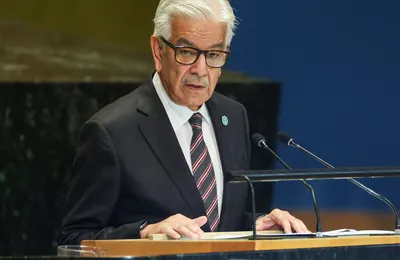Pakistan’s Defense Minister Signals Readiness Amid Escalating Tensions with India
In the wake of escalating hostilities between Pakistan and India, Defense Minister Khawaja Asif has declared that Pakistan is prepared to escalate its response if tensions with India continue to rise. This statement comes amid a series of military confrontations and diplomatic exchanges that have heightened concerns over the stability of the region.
Background: Rising Tensions in Kashmir
The current escalation traces back to a deadly attack on Indian tourists in Kashmir in April 2025, which India attributed to Pakistan-based militants. In retaliation, India launched “Operation Sindoor,” targeting what it described as terrorist infrastructure within Pakistan. Pakistan, however, reported civilian casualties and condemned the strikes as acts of aggression. The ensuing days saw both nations engaging in missile and drone attacks, leading to significant casualties and displacement along the border regions.(The Times, The Guardian, The Times)
Defense Minister’s Statement
Amid these developments, Defense Minister Khawaja Asif emphasized Pakistan’s readiness to respond to any further provocations. While he did not specify the nature of the “next level” response, his remarks suggest a willingness to escalate military actions if necessary. This stance reflects Pakistan’s broader strategy of maintaining a posture of deterrence while signaling its commitment to defending national sovereignty.(The Guardian)
International Mediation and Ceasefire Efforts
In response to the escalating conflict, international actors, including the United States, United Kingdom, Saudi Arabia, and China, have intervened to mediate a ceasefire between the two nuclear-armed neighbors. On May 10, 2025, both India and Pakistan agreed to an immediate ceasefire, announced by U.S. President Donald Trump. Despite this agreement, reports of continued drone strikes and artillery exchanges have emerged, indicating the fragility of the ceasefire and the deep-seated mistrust between the two nations.(The Guardian)
Nuclear Concerns and Strategic Posturing
The specter of nuclear conflict looms large over the India-Pakistan standoff. While India adheres to a no-first-use nuclear policy, Pakistan has not committed to such a stance, raising concerns about potential escalation. Defense Minister Asif’s assertion that no meeting of the National Command Authority—the body overseeing Pakistan’s nuclear arsenal—is currently scheduled, may be an attempt to allay fears of imminent nuclear engagement. However, the situation remains tense, with both sides maintaining high alert levels.(WSJ, Reuters)
Conclusion
The recent statements by Pakistan’s Defense Minister underscore the precarious nature of the current India-Pakistan relationship. While international mediation has achieved a temporary ceasefire, the underlying issues fueling the conflict remain unresolved. The potential for further escalation persists, necessitating sustained diplomatic efforts and confidence-building measures to prevent a descent into full-scale war.
